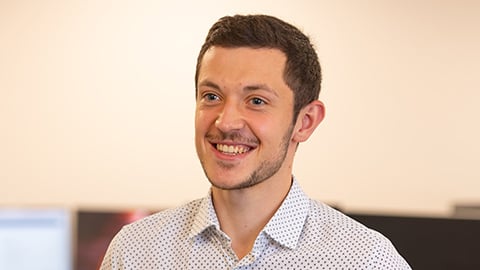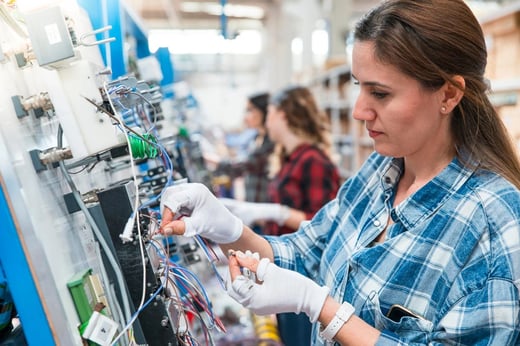
Food & beverage industry - trends to be aware of in 2024
April 2024
42T consultant Lawrence Rice-Williams recently attended Anuga FoodTec 2024 in Cologne and had these observations on the latest trends in the food and beverage industry
Key themes
The food and beverage industry accounts for approximatley 20% of global energy and water consumption.
At Anuga FoodTec 2024, there was a significant emphasis on providing manufacturers with the necessary tools and knowledge to enhance their process understanding, enabling them to exert tighter control over their operations.
This could lead on improvements across multiple areas, including the efficient use water, gas and electricity as well as reductions in reducing product defect rates and wastage.
%20(1).webp?width=848&height=492&name=Anuga2%20(1)%20(1).webp)
Lawrence says, “The key theme of the event was responsibility which was reflected by the exhibitors in two distinct trends.
Firstly, brands are taking responsibility for their consumers’ health, shown by the influx of ‘better-for-you’ products, containing ingredient reformulations or functional food offerings. Secondly, there is a continued push to reduce the impact, on the planet, of manufacturing both new and existing products.”
Reducing the impact
The integration of AI, into a broad range of sensors, has enabled real-time monitoring of almost all stages of a process.
“Whether it’s the detection of defective products, faulty packaging, or the continuous measurement and adjustment of process steps, AI-enabled quality control systems help manufacturers to improve process efficiency and reduce waste.”
%20(1).webp?width=729&height=411&name=shutterstock_2072769434%20(3)%20(1).webp)
The data these systems provide, can be used to continually optimise each stage of a process, making the best use of resources while ensuring that the product meets the required specifications. This approach not only prioritises sustainability, but also offers the added benefit of profitability.
Working together
“On the Innovation Stage at Anuga, there was an insightful panel discussion about how collaboration is an essential part of innovation in the food and beverage industry.”
Companies often struggle to innovate due to a lack of bandwidth to address the important but difficult challenges that will help to secure their future – either through new product development or improvement to existing processes.
The use of external partners provides companies with an opportunity to bring in specialist support which can offer an unblinkered yet focused approach to the challenge.
%20(1).webp?width=732&height=488&name=shutterstock_2194739681%20(2)%20(1).webp)
Does engaging with consultants make a difference?
As well as supporting clients with the development of new products, our work encompasses how products are manufactured.
We frequently assist with optimising existing processes as well as establishing completely new manufacturing capabilities for clients; this can either be through involving new process innovation or by identifying transferable manufacturing approaches from other industries.
%20(1).webp?width=705&height=445&name=Anuga3%20(1)%20(1).webp)
Lawrence adds, "Our role as a consultancy, is to support our clients with the realisation of their strategic ambitions. We work collaboratively, to understand and challenge their desires and requirements, before using our structured innovation process, comprehensive analytical methodologies or phased product development programs to deliver real value."
With our support, our clients have been able to:
- Increase the throughput of existing processes
- Reduce the product defect rate or process waste volume
- Improve process sustainability through the efficient use of water, gas or electricity
- Identify routes to exploit under-utilised process capabilities
- Implement greater process understanding and control
Was this article useful? Have a challenge of your own?
Email answers@42technology.com or give us a call on +44 (0)1480 302700.

Lawrence Rice-Williams is a consultant mechanical engineer with extensive experience across sectors including healthcare, industrial and consumer. His specific passion lies within the Food and Beverage industry, with a focus on innovation, sustainability and continuous improvement.
Lawrence has a strong track record of supporting clients in innovating within the constraints of existing processes, envisioning future production landscapes and identifying cross-industry technology transfers to drive progress. His proficiency is underscored by a comprehensive understanding of net zero principles and Lean Six Sigma methodologies, which enables him to align strategic initiatives with tangible outcomes.
If you would like to find out more, contact Director of Food & Beverage, Stuart Gilby :
answers@42T.com | +44 (0)1480 302700 | Stuart Gilby | LinkedIn
Share this article:
Related Articles

Manufacturing & Automation, Industrial
How to bring sensing in manufacturing out of the lab and onto the line

Manufacturing & Automation
Digitalisation in manufacturing - building on the foundations of good data

Manufacturing & Automation
The human factor in manufacturing: when to automate and when not to

What will you ask us today?
We believe in asking the right questions to drive innovation; when we know the right questions, we generate the ideas to answer them.

